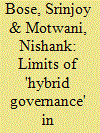| Srl | Item |
| 1 |
ID:
149614


|
|
|
|
|
| Summary/Abstract |
In this article, the authors conduct a comparative review of the strategic imperatives driving Sino-Indian policy on Afghanistan in the post-2014 scenario. The article argues that divergent strategic imperatives make cooperation difficult and/or unlikely. This analysis is based on a broader consideration of both contemporary history and geopolitical dynamics shaping the foreign policy considerations of these two countries, and an assessment of the impact of ongoing bi-lateral and regional aspirations. The authors begin by highlighting the salient dynamics that have historically characterized and driven Indian and Chinese foreign policy in general and on Afghanistan. They find that Afghanistan, although not a primary focus of either state’s foreign or security policy, historically, is increasing in importance for both; India and China compete on a range of economic and security issues.
|
|
|
|
|
|
|
|
|
|
|
|
|
|
|
|
| 2 |
ID:
181947


|
|
|
|
|
| Summary/Abstract |
The development of land rights programs is deeply rooted in power relations. Using discourse analysis, this paper unpacks how Western logics (assumptions and conventions) regarding ‘best practices’ for property rights institutions and tenure security impact the design of peacebuilding programs. In 2017, the Government of Timor-Leste passed a controversial Land Law Package. These laws were initially developed for a USAID land reform program. But local dynamics, actions, and interests were ignored. Examining civil society exclusion from decision-making infers a reluctance to acknowledge local voices and practices that threaten liberal peacebuilding interests. This paper is organised into two parts. In the first, we argue that peacebuilding ‘best practices’ reflect how dominant Western discourses create conceptual boundaries (‘violent hierarchies’) to restrict the recognition of indigenous ideas as legitimate. In the second, we examine Timorese civil society efforts to improve the land reform program through acts of resistance to bodies of authority. Overall, we illuminate how in Timor-Leste Western assumptions and conventions contributed to boundaries to local participation, which contradicts liberal narratives of empowerment and capacity-building.
|
|
|
|
|
|
|
|
|
|
|
|
|
|
|
|
| 3 |
ID:
133595


|
|
|
|
|
| Publication |
2014.
|
| Summary/Abstract |
The following commentary argues that the strategic and structural solutions proffered by advocates of 'hybrid' governance-encompassing elements from distinctly different ideological backgrounds or schools of thought-ignore or fail to address certain inherent shortcomings in their approach that are counter-productive to the ongoing and long-term statebuilding and peacebuilding projects in Afghanistan. The following study elucidates some of these shortcomings.
|
|
|
|
|
|
|
|
|
|
|
|
|
|
|
|